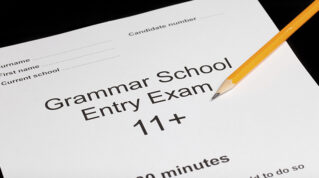There is “no evidence” selective school systems have a positive effect on pupil outcomes, and those who don’t get into grammar schools fare worse than those in areas without them, a study has found.
The research from academics at Durham University and the UCL Institute of Education found attending grammar school “might be associated with a small positive difference in KS4 attainment”.
But the benefits associated with grammar school attendance “are wiped out by the lesser progress of pupils in selective areas who do not attend grammar schools” when compared to those in non-selective areas.
The study, published in peer-reviewed journal the Educational Review, analysed GCSE results data from 2016 for around 500,000 pupils.
It is the latest of many pieces of research into the impact of grammar schools, a controversial model limited to just 163 of more than 3,000 secondary schools in England.
The research found the probability of achieving five A* to A grades in areas with grammar schools was “about 90 per cent of that of non-selective LAs” once pupil characteristics and prior attainment is taken into account.
“For pupils in selective areas, regardless of whether they attended a grammar school, their chances of getting top GCSE grades are lower than equivalent pupils in comprehensive LAs,” the study concluded.
It follows the results of a 2016 study by the Education Policy Institute, which found grammar schools did not boost attainment, again, once pupils’ prior attainment and background were taken into account.
The gap between pupils on free school meals and their peers in attaining five Cs or above at GCSE was also wider in selective areas, the previous study found.
‘Big-fish-little-pond effect’
The new report’s authors said that “while the general results of the two systems reveal no superiority in terms of pupils’ academic outcomes, the detailed pattern of KS4 grades suggests that the selective system is, contrary to popular belief, detrimental to high performers”.

This “may be due to the high attainment in grammar schools which is negatively correlated with the self-perception of high-achieving pupils, according to the big-fish-little-pond effect”.
However, academics said the outcome also “might also be a result of confounding factors, such as the fact that there are differences in performance between geographical areas of England”.
London, for example, “might pull the average up”, and this effect “deserves investigation in future studies”.
Dr Mark Fenton, chief executive of the Grammar School Heads’ Association, said the study “acknowledges that there is ‘no evidence of a systematic difference in pupils’ academic outcomes’ between selective and non-selective areas”.
“The researchers concede that the rather unexpected finding that able children have a lower chance of achieving top grades if they attend a grammar school may well be the result of a statistical quirk. It certainly feels counterintuitive.”
Inclusivity plans stall
Grammar schools are often criticised for the impact they have on other schools in the areas around them, given the 11-plus test for entry aims to select the most academically able in the catchment area.
Selective schools also generally educate far fewer pupils from disadvantaged backgrounds than the average for their areas.
Ministers have in recent years sought to encourage them to diversify their intakes in exchange for expansion cash.
However, an agreement with grammar schools to boost attendance by poorer pupils had little impact, a government evaluation found.
Schools Week also revealed last year how the disadvantage gap between grammar schools handed £64 million to become more inclusive and their non-selective neighbours has widened.
‘A lack of role models’
According to today’s research, for pupils who fail to get into grammar schools in selective areas, “a lack of role models, a sense of failure and a higher concentration of disadvantaged pupils may impede their progress, as various research suggests that education integration is beneficial in various ways”.
“Therefore, while the general results for the effect of the two systems reveal superiority
of neither system, the internal pattern implies the potential negative results of the selective system from which high performers suffer.”
Expansion of academic selection in England was proposed last year during Liz Truss’s brief tenure as prime minister.
Current PM Rishi Sunak is less keen, and education secretary Gillian Keegan said last year she was more focused on those who went to comprehensive schools.
Co-author Dr Xin Shao said the study “adds to the evidence that the expansion of grammar schools and the selective system is unlikely to raise national academic standards”.
She said the “costs of reorganising our education system to have more selection would be high, and there are much more important priorities for investment to support equalising opportunities for those regardless of their family background”.















Your thoughts